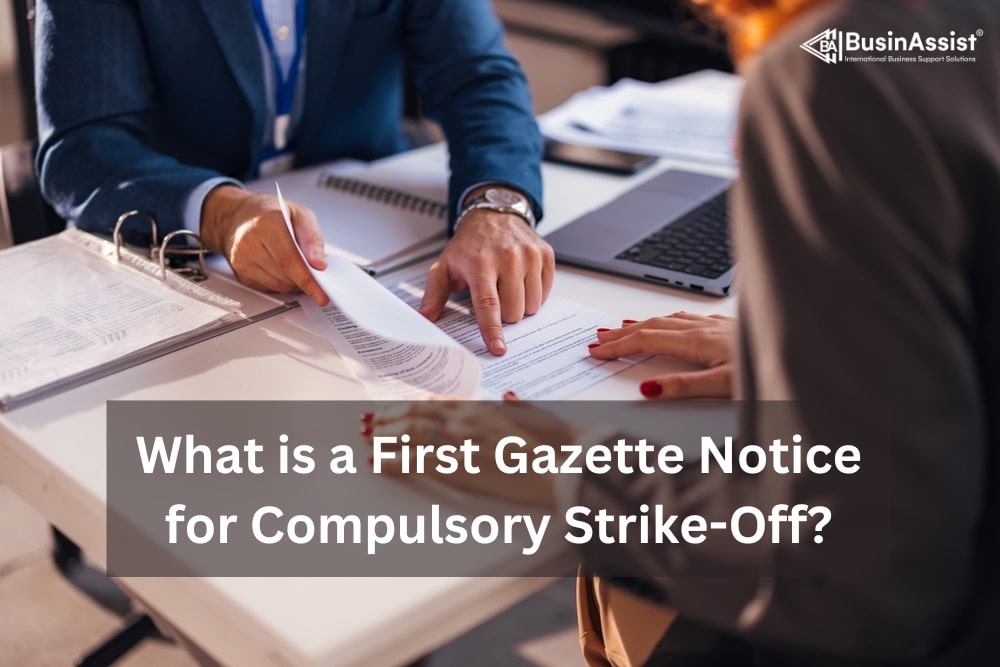Last Updated on December 18, 2025 by Joy Kyalo

A first gazette notice for compulsory strike-off is a serious action initiated to forcibly close a company due to its failure to comply with legal obligations under the Companies Act.
When a company fails to submit its annual confirmation statements or file its accounts on time, Companies House initiates the process of compulsory strike-off and publishes a public gazette notice. The public announcement serves as the first gazette notice.
The public notice informs the general public, shareholders, suppliers, employees, and creditors. The notice allows creditors to object to the notice within 2 months since they are owed money and when the company is struck off, they will not have access.
What are the risks of compulsory strike-off? Can a company be restored after a compulsory strike-off? This article answers these questions and many more.
Why would a company receive a first gazette notice for compulsory strike-off?
Companies House initiates compulsory strike-off when a company;
- Fail to file company accounts on time.
- Fail to pay taxes.
- Fail to declare a new company address.
- Late submission of penalties
- Not actively trading.
- Failing to correspond with Companies House.
The publication of the first gazette notice of compulsory strike-off happens after the Companies House tries to reach the affected company and fails to get a response.
It is important to act quickly once you receive the notification and complete all the actions needed.
What happens after a first gazette notice for compulsory strike-off?
Now that Companies House has issued the first gazette notice of compulsory strike-off, without any objection within the 2 months, your company will legally cease to exist. After the first gazette notice, you have two options for your company – continue trading or have it dissolved. Both options involve specific procedures to follow.
If you want to keep your company trading, you will have to contact the Companies House immediately and address the issues that led them to initiate the strike-off.
You can also request Companies House to suspend the strike off and ask for more time for filing outstanding accounts or confirmation statements, providing the new company address, paying penalties if any, paying all your taxes, and sending off relevant statements.
A company strike-off might be halted if a creditor successfully objects to the first gazette notice. This gives you time to ensure you make all fillings and submissions and deal with the debts you are owed.
If your company is accepting the strike-off, you have to make sure you have no outstanding debts and you have ceased trading.
However, if you have any outstanding debts, you will have to follow the legal dissolution process of company closure.
We offer company closure dissolution services for a UK registered company with all relevant guidance provided to the directors during the dissolution process. We submit your company closure (dissolution) application and also communicate with Companies House on your behalf to address any queries they may have.
We will allow you to use our address as the company’s registered correspondence address for free during the dissolution process, that is if you are an existing virtual office customer. Customers who do not have a UK virtual office subscription with us and wish to use our address as their company’s registered office address and correspondence address during the dissolution process can email us after making the order and we will allocate you with a unique address for your company.
What are the consequences of compulsory strike-off?
- The company ceases to legally exist. Companies House will remove your company from the register. This means the company can no longer conduct business activities, enter into contracts, hold assets, or engage in financial transactions.
- Directors may be personally liable for any remaining debts. Creditors can hold directors and guarantors responsible for any outstanding company debts that existed at the time of the strike-off.
- Directors may also face criminal charges if they intentionally defrauded creditors or engaged in fraudulent activities, which led to the strike-off.
- Getting the company struck off will damage its reputation. Companies House publicly records the strike-off, which can deter potential partners, investors, suppliers, and clients from engaging with the previously dissolved entity.
- Reactivating the company will be a challenging recovery process. You’ll need to pay all outstanding fees and file overdue documents to make the company active again.
- The company will also lose any assets it had at the time of the strike-off.
- Your bank accounts will be frozen.
How can a company prevent compulsory strike-off?
Filing statutory documents on time:
A business can avoid forced dissolution by filing statutory documents on time at Companies House. Each company, whether trading or not, must annually file a set of accounts with Companies House which shows how a company has performed over the accounting period.
Annual accounts must be filed within nine months after your accounting reference date. For example, if your financial year starts on 1st May your annual accounts must be filed by 31st January. Alongside your annual account, you’re required to file your corporation tax return.
Confirmation statements need to be filed annually within 14 days of the end of your confirmation period. The 12-month period starts on either your UK company formation date or the date you filed your last confirmation statement.
According to HMRC, the deadline for submitting your VAT return online is usually 7 days after the end of an accounting period.
We will help you file confirmation statements quickly and accurately. If you have missing documents or codes from Companies House we will help you get them at no additional cost.
With the price changes in Companies House, you can file your confirmation statements as early as now to save money even if it is not due yet. It will be valid for 1 year from the date of filing.
Object strike-off:
You can challenge the strike-off by providing evidence of all your statutory documents to demonstrate compliance with Companies House requirements. Anyone can object to the dissolution process.
If no one doesn’t challenge the strike-off, a second gazette notice will be issued to announce the business has been struck off the Companies House register.
Update the company’s address:
You need to inform HM Revenue & Customs (HMRC) of any changes to your registered office address within 30 days. You will also need to change your business records. Regularly update any changes in company details including those of the directors.
Maintain active trading status:
Ensure your company remains actively engaged in business activities. If the company is dormant, file all the necessary documents to confirm its status.
Respond to Companies House mail:
Keep track of official correspondence with Companies House. Maintain accurate contact details to receive notifications.
With the new reforms, every company will need to ensure that it registers an ‘appropriate address’. An appropriate address is one where any documents sent to the registered office should be expected to come to the attention of a person acting on behalf of the company or any documents sent to that address can be recorded by an acknowledgment of delivery.
PO Boxes are no longer valid. If you currently use a PO Box as your registered office address, you’ll need to change it using your company’s authentication code.
We offer London virtual office address services that allow you to use any of our addresses for your business without actually being located there. The UK virtual office address caters to the requirements of all types of UK and non UK businesses. We have a range of cheap virtual business address locations to choose from located in the UK, Central London, East London, Northern Ireland, Scotland, and Wales. All of our virtual office packages come with mail handling.
How can a company be restored after being struck-off
To restore your company after strike-off through administrative restoration or court order. You can ask Companies House for administrative restoration if:
- You previously held a director or shareholder role.
- The company’s dissolution occurred less than 6 years ago.
- Business operations continued at the time of dissolution.
- You were a director or shareholder.
- It was still actively trading when it dissolved.
To proceed with restoring its status:
You will fill out the RT01 application form.
Include a £100 cheque made payable to ‘Companies House’.
Submit any overdue documents, such as accounts or confirmation statements (formerly annual returns).
Pay outstanding filing fees or penalties. If company assets exist, get a waiver letter from Bona Vacantia.
A compulsory strike-off does not mean it’s the end for your company. Once you get the first gazette compulsory strike off, you can object immediately and continue trading. BusinAssist will help with the filing of your confirmation statements and VAT returns to keep you compliant with the Companies House regulations.
However, if you want to legally cease your company’s operations, we help with the company closure process so that you can exit with ease.
Read Also:
- What is a Certificate of Incorporation and How Can one be Obtained? 2024 Guide
- What is Postal Fraud and How can BusinAssist Help me From Being a Target?
- How Long Does It Take to Sponsor an Employee in the UK?
- How to Fill Out a Stock Transfer Form J30: A Step-by-Step Guide
- What is the VAT threshold? – A Comprehensive Guide
- Right to Work in the UK: How to Obtain a Share Code Online
- What Are the Disadvantages of a Dormant Company?
- Everything You Need to Know About Companies House Default Address
- What is a VAT registration number? – A complete guide

The BusinAssist Editorial Team has 15+ years of experience writing about small business and company formation in the UK, Canada, and the USA. We simplify complex processes and provide practical insights to help entrepreneurs succeed. Business Assist with BusinAssist – your partner for business success.


Very interesting information! Perfect just what I was
looking for!
Damn i thought it would have been stricter